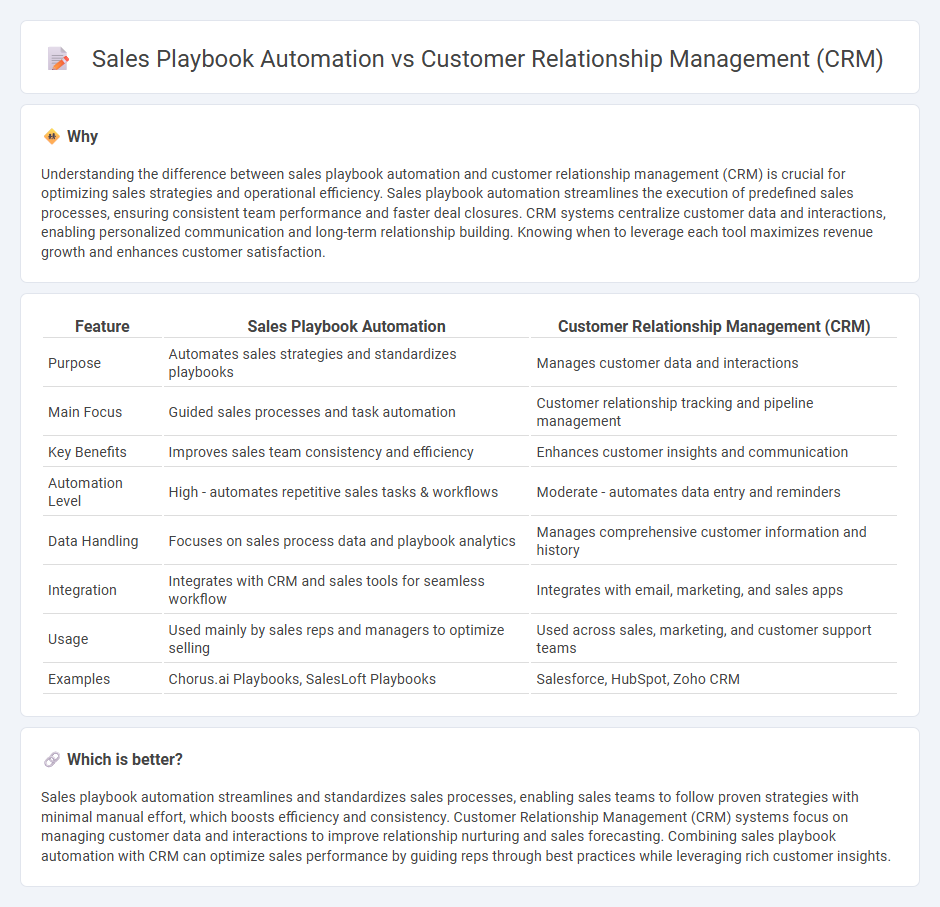
Sales playbook automation streamlines repetitive tasks and standardizes best practices, increasing efficiency and consistency in sales processes. Customer relationship management (CRM) systems centralize customer data, track interactions, and enhance relationship building for targeted and personalized sales efforts. Explore how integrating sales playbook automation with CRM can transform your sales strategy and boost revenue growth.
Why it is important
Understanding the difference between sales playbook automation and customer relationship management (CRM) is crucial for optimizing sales strategies and operational efficiency. Sales playbook automation streamlines the execution of predefined sales processes, ensuring consistent team performance and faster deal closures. CRM systems centralize customer data and interactions, enabling personalized communication and long-term relationship building. Knowing when to leverage each tool maximizes revenue growth and enhances customer satisfaction.
Comparison Table
| Feature | Sales Playbook Automation | Customer Relationship Management (CRM) |
|---|---|---|
| Purpose | Automates sales strategies and standardizes playbooks | Manages customer data and interactions |
| Main Focus | Guided sales processes and task automation | Customer relationship tracking and pipeline management |
| Key Benefits | Improves sales team consistency and efficiency | Enhances customer insights and communication |
| Automation Level | High - automates repetitive sales tasks & workflows | Moderate - automates data entry and reminders |
| Data Handling | Focuses on sales process data and playbook analytics | Manages comprehensive customer information and history |
| Integration | Integrates with CRM and sales tools for seamless workflow | Integrates with email, marketing, and sales apps |
| Usage | Used mainly by sales reps and managers to optimize selling | Used across sales, marketing, and customer support teams |
| Examples | Chorus.ai Playbooks, SalesLoft Playbooks | Salesforce, HubSpot, Zoho CRM |
Which is better?
Sales playbook automation streamlines and standardizes sales processes, enabling sales teams to follow proven strategies with minimal manual effort, which boosts efficiency and consistency. Customer Relationship Management (CRM) systems focus on managing customer data and interactions to improve relationship nurturing and sales forecasting. Combining sales playbook automation with CRM can optimize sales performance by guiding reps through best practices while leveraging rich customer insights.
Connection
Sales playbook automation integrates seamlessly with customer relationship management (CRM) systems by streamlining sales processes and ensuring consistent execution of best practices. Automated playbooks leverage CRM data to personalize interactions, track customer journeys, and optimize lead nurturing and conversion rates. This connectivity enhances sales team productivity, improves forecast accuracy, and drives revenue growth through data-driven decision-making.
Key Terms
**Customer Relationship Management (CRM):**
Customer Relationship Management (CRM) systems centralize customer data, track interactions, and streamline sales pipelines to enhance customer engagement and retention. Advanced CRM platforms integrate AI-driven insights and automation to personalize communication and predict customer needs effectively. Explore how CRM technology can revolutionize your business strategies and customer outcomes.
Lead Tracking
Customer relationship management (CRM) systems centralize lead tracking by aggregating client data and interactions to streamline sales processes and enhance customer insights. Sales playbook automation focuses specifically on standardizing and automating lead engagement strategies to increase conversion rates and reduce response times. Explore detailed comparisons and best practices to optimize your lead tracking efficiency.
Contact Management
Customer Relationship Management (CRM) systems centralize contact management by storing detailed customer information, tracking interactions, and segmenting audiences for targeted marketing efforts. Sales playbook automation enhances this process by providing sales teams with guided scripts, workflows, and best practices tailored to each contact's profile, improving engagement and conversion rates. Explore how combining CRM and sales playbook automation can optimize your contact management strategy for higher sales efficiency.
Source and External Links
What is CRM (Customer Relationship Management)? - TechTarget - CRM is a combination of practices, strategies, and technologies companies use to manage and analyze customer interactions and data throughout the customer lifecycle to improve service, retention, and sales growth, integrating various channels and offering operational, analytical, and collaborative CRM types.
What Is CRM? | IBM - CRM is a set of integrated technologies for documenting, tracking, and managing a company's interactions with customers and prospects, supporting sales processes, lead management, forecasting, and enhancing customer experience across deployment sizes and industry verticals.
What is CRM (customer relationship management)? Full guide - CRM helps sales teams track and drive revenue while improving customer relationships by centralizing customer interactions and automating workflows to boost productivity, offering personalized recommendations and pipeline visibility.
 dowidth.com
dowidth.com